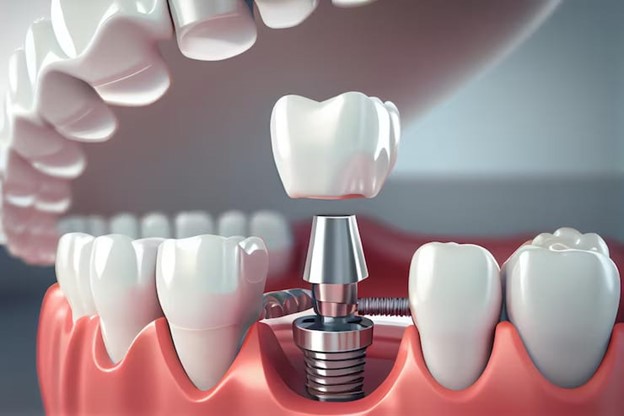
Missing teeth affect more than just your smile—they can impact your confidence, oral health, and overall quality of life. Fortunately, dental implants for missing teeth provide a long-lasting and natural-looking solution. This blog explores the benefits, longevity, and transformative potential of dental implants, helping you decide if they’re the right option for you.
Why Choose Dental Implants for Missing Teeth?
Dental implants are widely regarded as the gold standard for replacing missing teeth. Unlike dentures or bridges, implants integrate with your jawbone to provide a secure and permanent solution.
Key Benefits of Dental Implants
Permanent Tooth Replacement
Dental implants are designed to last a lifetime with proper care.
Enhanced Oral Health
Implants prevent bone loss and maintain the natural structure of your jaw.
Natural Look and Feel
Implant-supported crowns are custom-made to blend seamlessly with your natural teeth.
Improved Functionality
Chewing, speaking, and smiling feel as natural as with real teeth.
Learn more about how implants can restore your smile on our dental implants service page.
How Do Dental Implants Work?
Dental implants involve a multi-step process that ensures durability and natural aesthetics:
Consultation and Planning
Your dentist evaluate your oral health and bone density to determine if implants are the right choice.
Implant Placement
A titanium post is surgically inserted into the jawbone to serve as the artificial root.
Osseointegration
Over several months, the implant fuses with the jawbone, creating a stable foundation.
Crown Placement
Once the implant is secure, a custom crown is attached, completing your new tooth.
Discover more about the implant process in our blog on advanced dental implant procedures.
The Long-Term Benefits of Dental Implants

Longevity and Durability
With proper care, dental implants can last for decades, making them a cost-effective solution over time.
Improved Jawbone Health
Missing teeth can lead to bone loss, but implants stimulate the jawbone, preserving its density and structure.
No Impact on Surrounding Teeth
Unlike dental bridges, implants don’t rely on neighboring teeth for support, maintaining their integrity.
High Success Rates
Dental implants boast a success rate of over 95%, making them one of the most reliable options for tooth restoration..
Learn about why implants are considered a reliable, long-term dental solution in our blog on implant longevity and success rates.
Are You a Candidate for Dental Implants?
Dental implants are suitable for most adults. Ideal candidates include those with:
- Good oral health and healthy gums.
- Adequate jawbone density to support the implant.
- Commitment to maintaining oral hygiene.
If you’ve experienced bone loss, procedures like bone grafting can prepare your jaw for implants. Visit our contact page to schedule a consultation and learn more about treatment options.
Dental Implants vs. Other Tooth Replacement Options

Dentures
Pros: Affordable upfront cost.
Cons: Less stable and comfortable compared to implants.
Bridges
Pros: Fixed and functional for small gaps.
Cons: Requires grinding down adjacent teeth, potentially weakening them.
Dental Implants
Pros: Long-lasting, natural-looking, and preserve jaw health.
Cons: Higher initial cost but offers superior long-term value.
For a detailed comparison of treatment options, read our blog on missing tooth solutions.
How to Maintain Oral Health After Getting Implants
Maintaining excellent oral hygiene is key to the longevity of dental implants. After your procedure:
- Brush and floss daily, especially around the implant site.
- Visit your dentist for regular checkups to monitor the health of your implants.
- Avoid smoking, as it can hinder healing and increase implant failure rates.
For more tips on oral health care, visit the Government of Canada: Oral Health Information.
FAQs About Dental Implants for Missing Teeth
Are dental implants painful?
The procedure is performed under local anesthesia, and most patients experience minimal discomfort.
How long does the implant process take?
The entire process, including healing, can take several months, but the results are worth the wait.
Can implants replace multiple missing teeth?
Yes! Implant-supported bridges or dentures can restore multiple teeth efficiently.
Dental Implants in Norwood: Your Trusted Solution
At Norwood Dentistry, we specialize in providing dental implants for missing teeth that transform smiles and lives.
Why Choose Us?
- Advanced Implant Technology: Ensuring precision and long-lasting results.
- Experienced Team: Our skilled professionals prioritize patient comfort and satisfaction.
- Personalized Care: We tailor every treatment plan to your unique needs.
Ready to restore your smile? Schedule a consultation today to explore your options for dental implants.